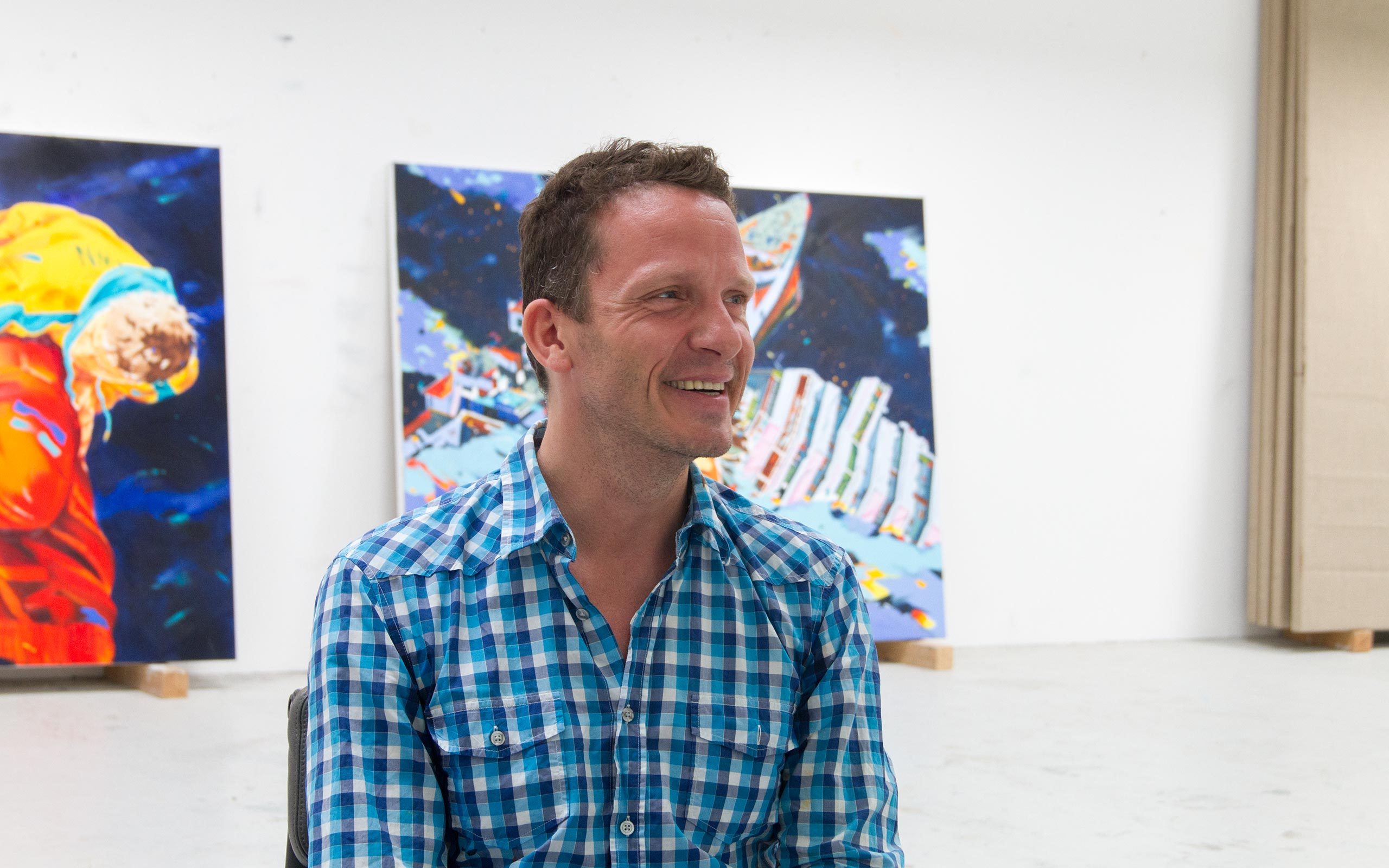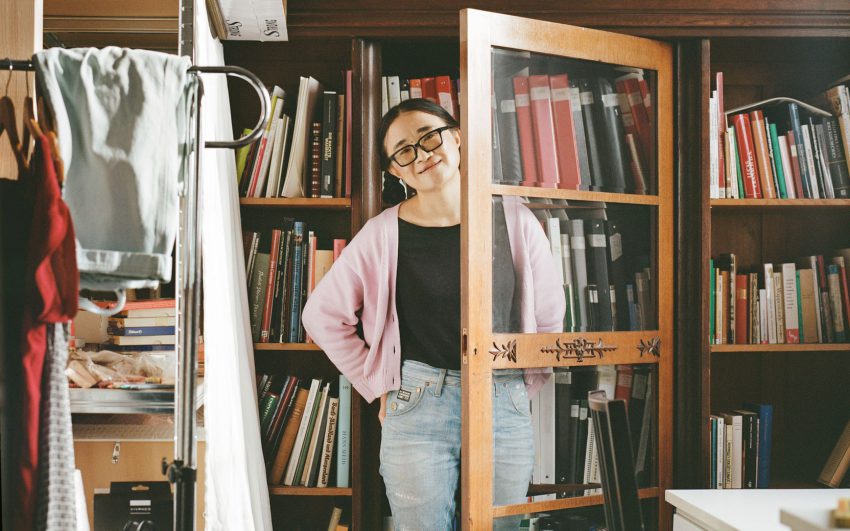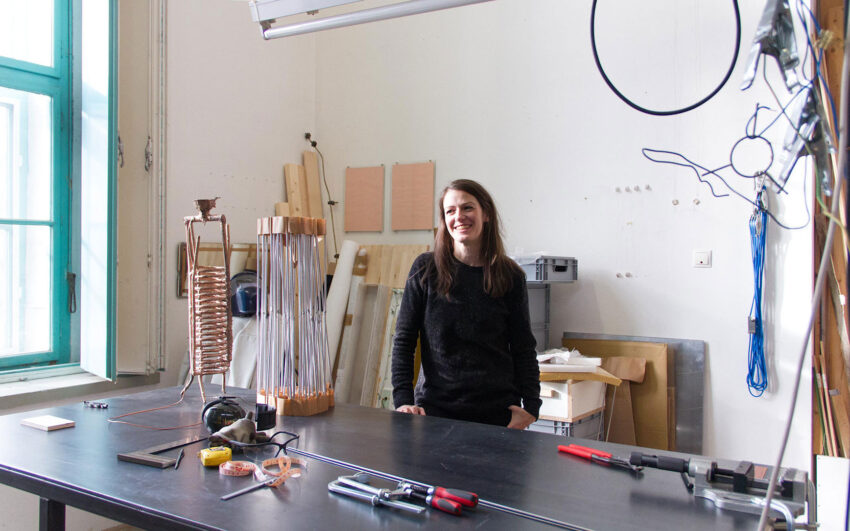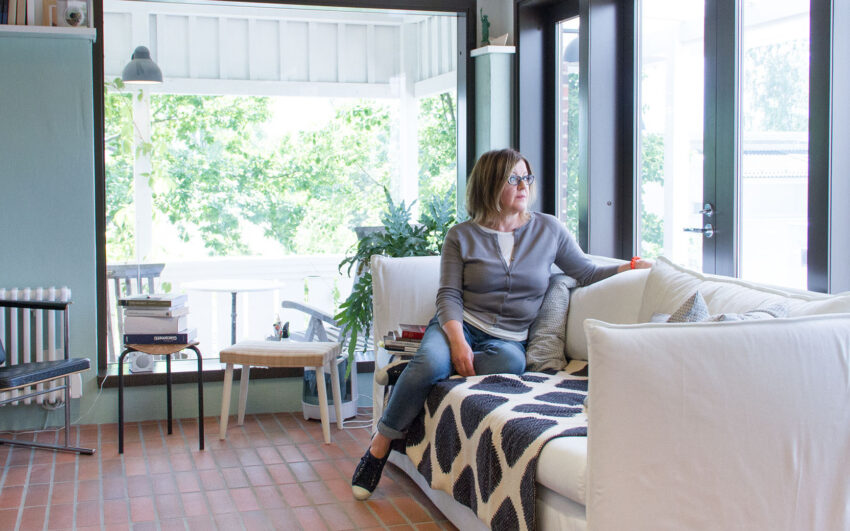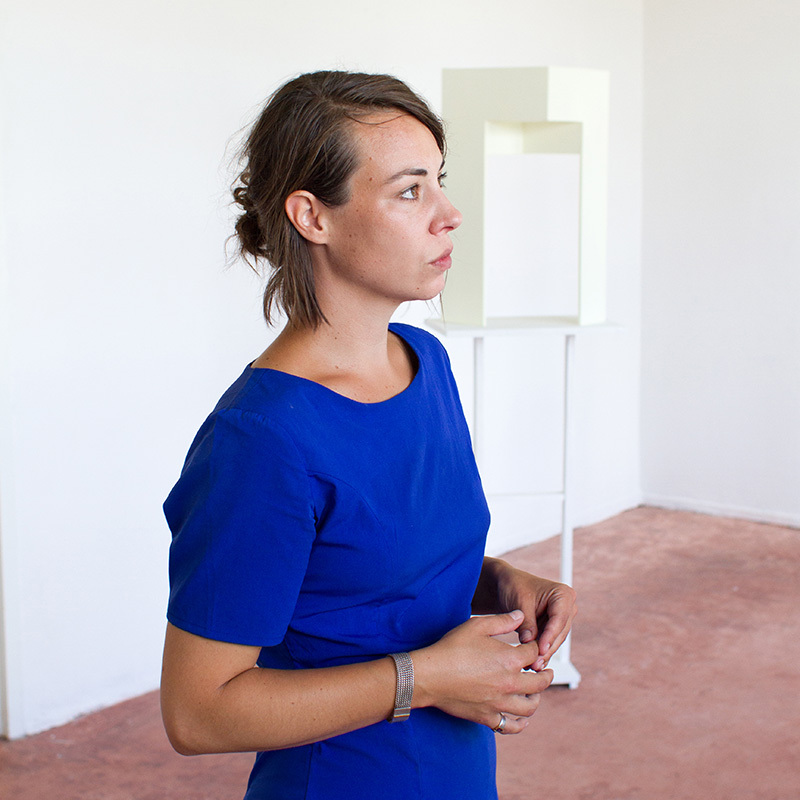Norbert Bisky is considered one of the most important contemporary German artists and representatives of figurative painting of the 21st century. In his early years, Bisky painted as if overexposed pictures in oil, influenced by the style of Socialist Realism, with which he grew up as a child of the GDR. He himself once described them as "washed with Lenor." Glistening brightly painted young, beautiful, happy men bursting with strength in pure untouched nature were central motifs. In the meantime, Norbert Bisky has left this probably, always only seemingly ideal, world. His more recent works show young bodies being eaten or hurled by centrifugal forces, torn-off limbs dripping with blood, destruction, chaos - the idyll is deceptive...
Norbert, last year you exchanged studios with Erez Israeli. He came to Berlin and you went to Tel Aviv, what made you decide to do this.
I’d been in Israel several times before we made the studio exchange. Israel is a beautiful and fascinating country, however, it’s in deep conflict, and many here believe they have the solution. I wanted to go there and judge for myself. I love traveling. It is very important to me in order to understand the world. I’ve also traveled a lot in South America which not so many people may be aware of.
Wouldn’t you agree that in Berlin you already live in one of the most international and most open cities in the world?
I’ve lived in Berlin since 1980, that is a long time. After all these years I must confess I don’t think Berlin is as fantastically beautiful as people always say it is. (Laughs) Even if Berlin itself is still interesting and enriching, it isn’t sufficient for me to understand how the world as a whole ticks. In my district of Berlin-Friedrichshain for example I experience people are constantly partying. One quickly feels like being confined in a “bubble”. I personally need more information, more visual information as well.
That sounds like an almost journalistic approach.
I think journalists approach things in a much more planned way. My starting point is different. I grew up in a country that has vanished although I haven’t even changed cities. I have experienced how when a society disintegrates, a change in perspective can alter one’s point of view completely. The collapse of the Soviet Empire set a lot in motion, the impact of which we are now experiencing. For many years, I thought that it had nothing to do with me, that I could continue painting my pictures and that I wouldn’t be affected by the waves going on around me. I have finally understood that this was certainly not the case.
Because of your family you were and are a rather public person. This is the impression of an outsider, of course, but if it is the case, has it influenced you as an artist?
Superficially it may appear that I was, but it’s not really true. In 1989 the Berlin Wall fell. In 2001 I had my first exhibition, it was only then that people began to take an interest in me. In between were twelve years that were very important to me. I studied art at the Berlin University of the Arts (UDK) and during an Erasmus exchange year in Madrid, I concentrated on many questions and things that I am still working on. These were very formative years; thank God, no one was interested in me during that time.
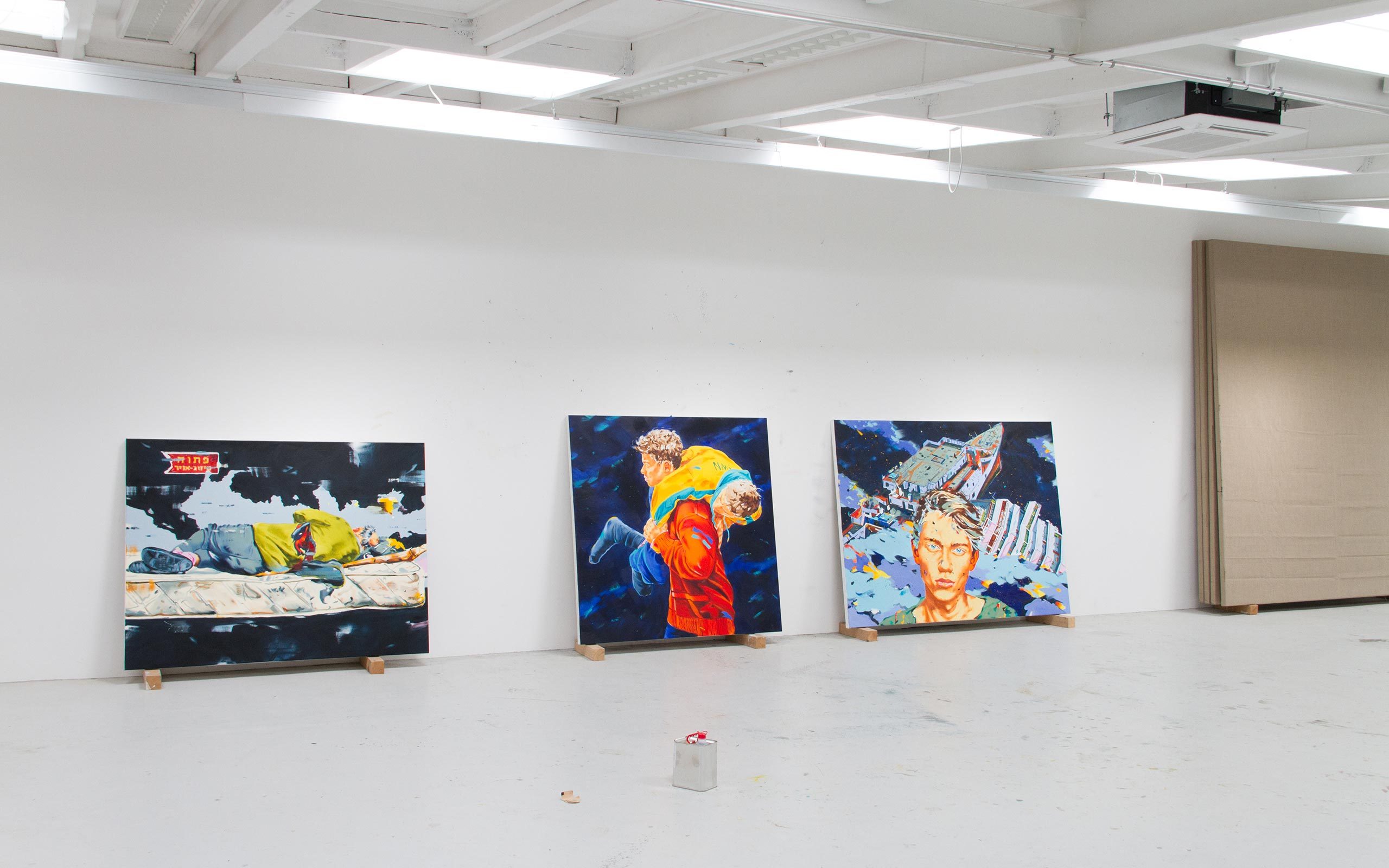
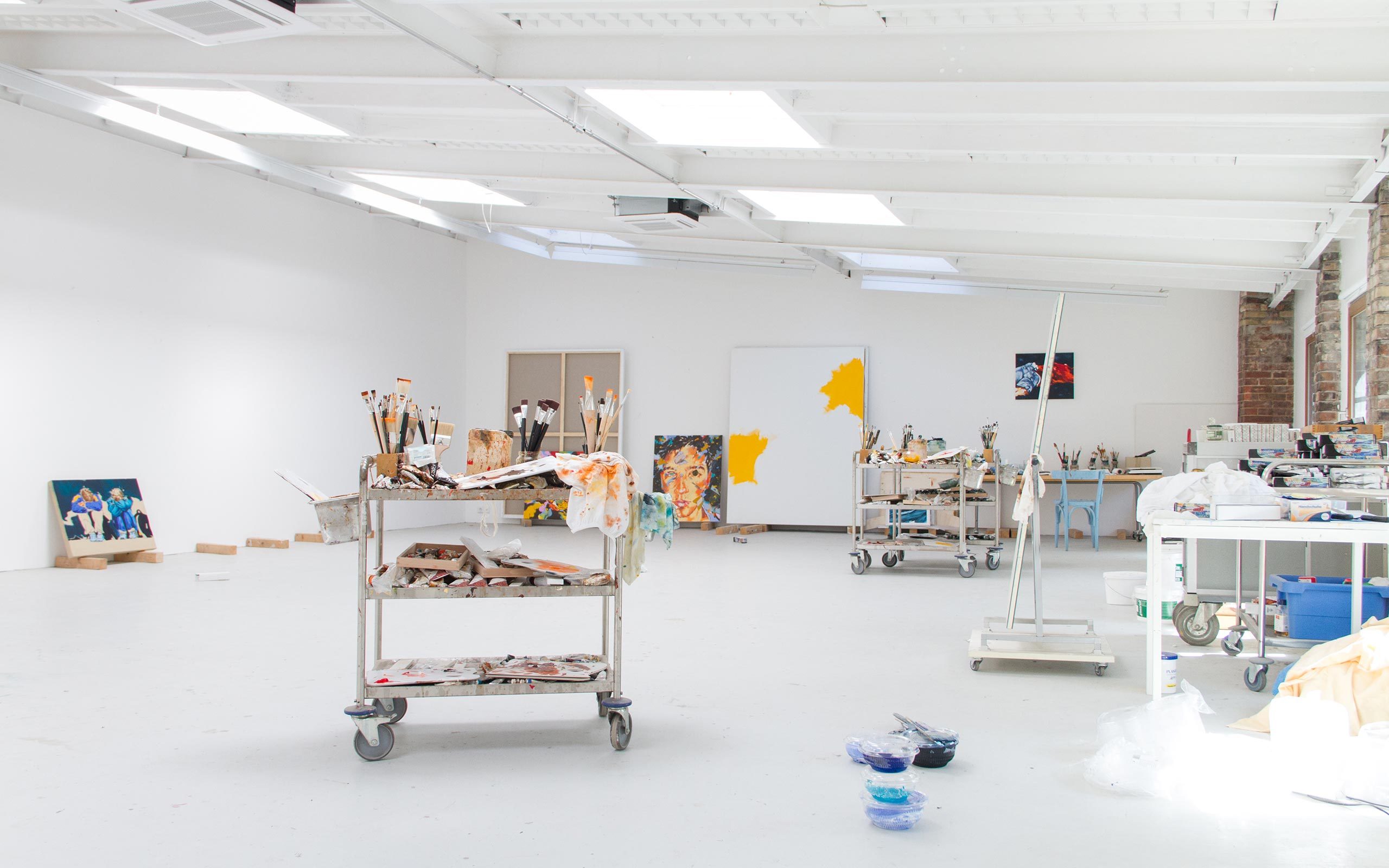
When the Berlin Wall fell you were nineteen years old. Did you already know during the GDR years that you wanted to be an artist?
No, it wasn’t at all clear. In the summer of 1989 I was basically concentrating on finishing my Abitur (the university entrance qualifications exam) and to take a few weeks of vacation afterwards. After the Abitur the timetable would inevitably be terrible: In October 1989 I was recruited into the People’s Army. I had plans for the time after my military service, I wanted to work in the field of social work. As I remember, my attitude was as if festering, I didn’t want to function perfectly. That didn’t mean that I had an affiliation with the resistance, I simply didn’t want to become established in a career in the former GDR, and that was what I emanated.
Before the fall of the Berlin Wall, as a youngster, was it clear to you that you would never travel to the West?
Yes. In the Gorbachev era there existed an atmosphere of transformation, and things were in motion. But before the fall of the wall, it seemed certain to me that I would never be able to see cities like Hamburg. That the wall would be torn down and we would all enjoy complete freedom to travel was simply inconceivable to me.
In November 1989 events developed rapidly and the Berlin Wall fell.
Exactly. Inasmuch as it wouldn’t have mattered what plans I might have had, because the wall was torn down and the country into which I was born and in which I grew up, imploded. I have thought a lot and for a long time about how I wanted to live my life.
In the early 1990s I just wanted to leave, I didn’t want to have anything to do with the former GDR, the East, and Berlin. I would have loved to go to California and not to have heard anything more about that whole shit any longer. Understanding that this wouldn’t work, and that I had to look intensively at myself, my origins, and my surroundings, was a process that took several years. It wasn’t however, until 1993, that I decided to study art.
“I grew up in a country that has vanished although I haven’t even changed cities.”
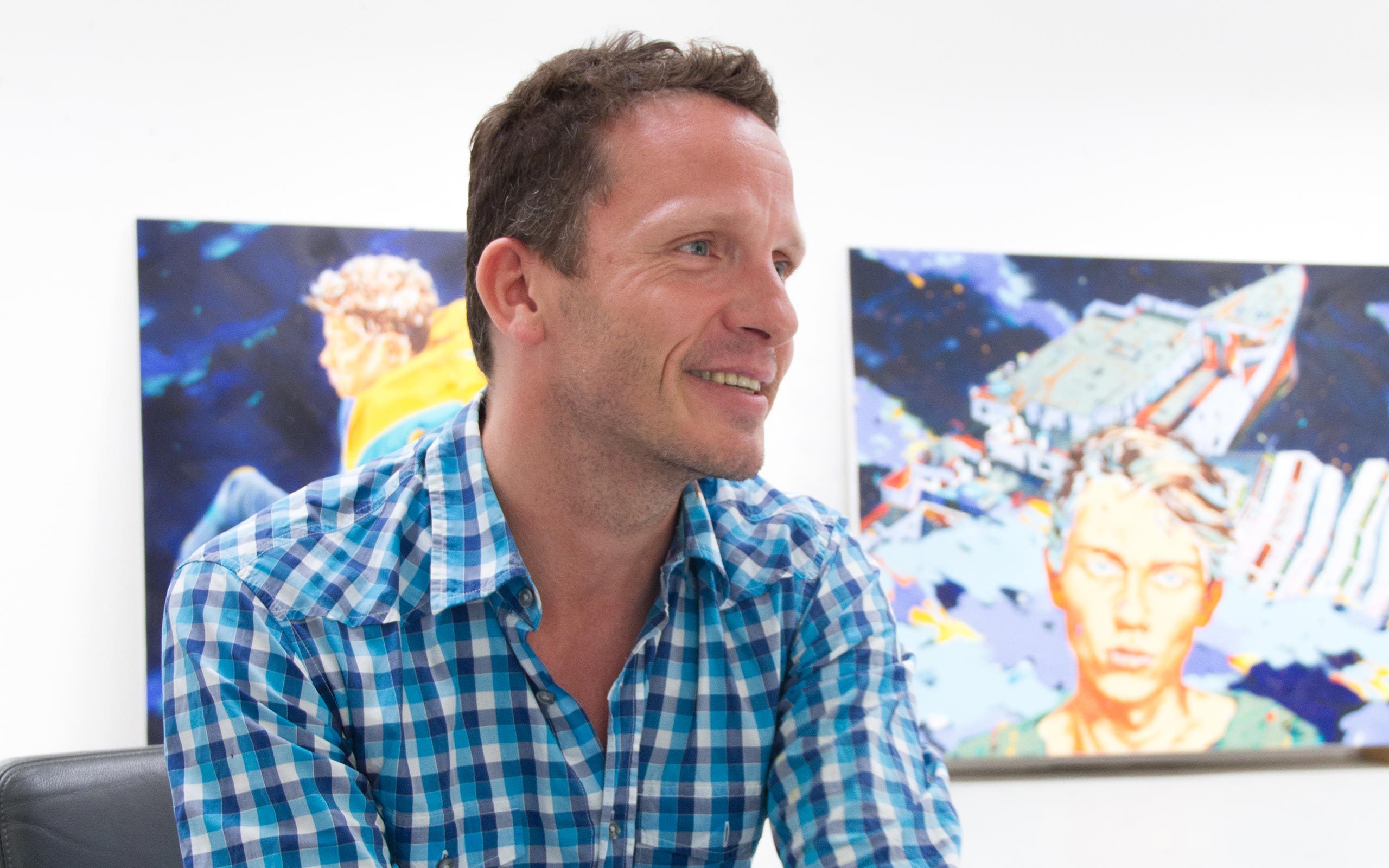
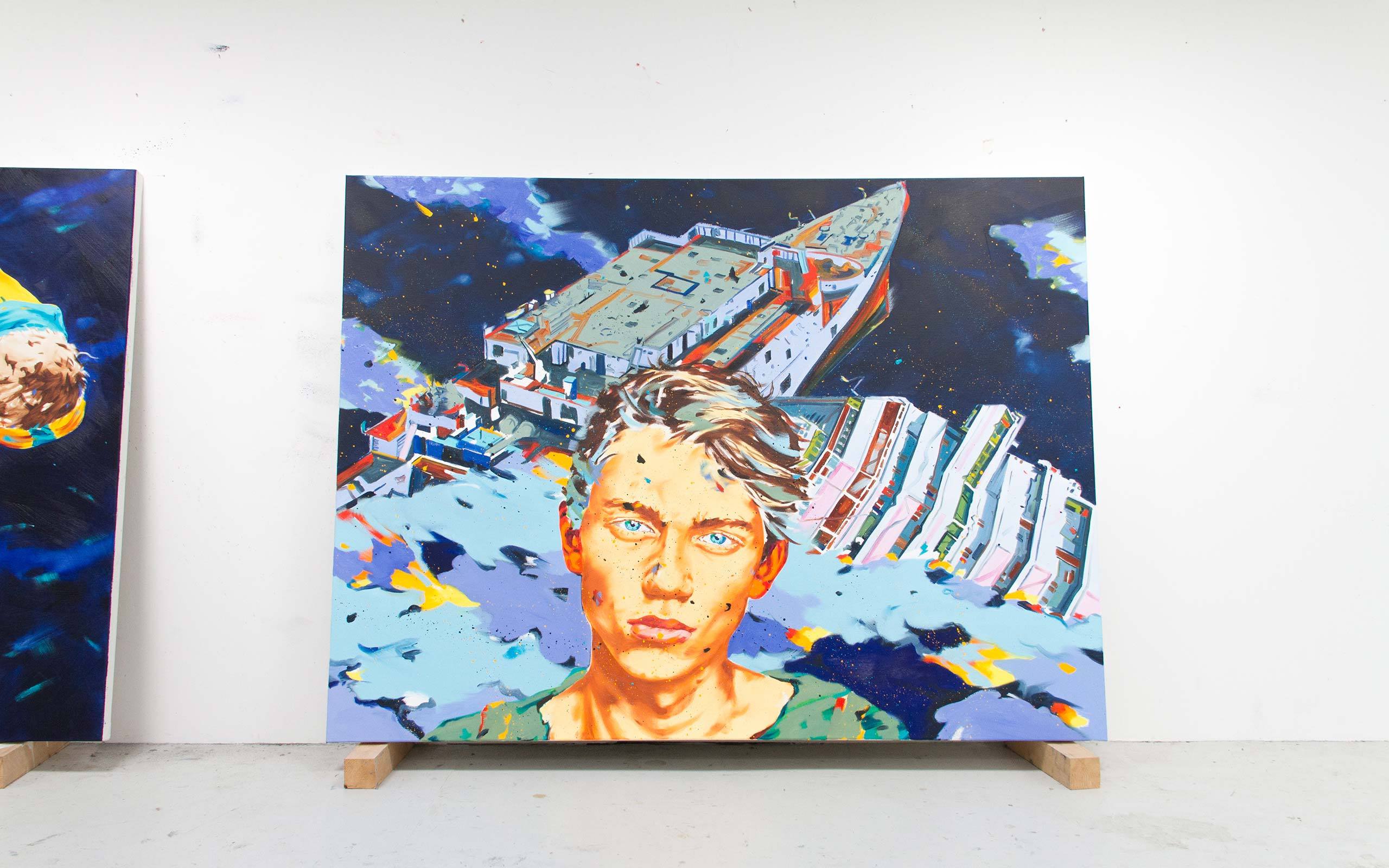
While the Berlin Wall was standing the idea of studying art was remote. How did you first come to decide that you would study art?
Well, if you really want to know, during and prior to that time of transformation, I saw artists as being very attractive. At the time, they were represented in the entire Eastern Bloc as intellectuals, film makers, writers, and one identified with them. I met artists who lived and radiated a certain freedom. It may sound absurd now, but there were people around who did what they wanted to do, and that was extremely attractive, of course like many others, I may have completely overrated that perception at the time. (Laughs) The expectations were enormous.
At the time of the transformation of the former GDR, it was an especially courageous decision to study art. How did your family and friends react to this?
My parents didn’t mind that I intended to study art. At the time, they were much too involved in the social transformation, their world had just collapsed. Many of my friends were disdainful, asking me if I was crazy. At that time everybody was looking for a safe job, they wanted to go into banking; the fear of not being able to succeed in the new world was omnipresent.
I had really thought about what I really wanted to do within the limited possibilities of the former GDR. Then all of a sudden Jackpot: suddenly I could do anything I wanted. I could have sold food on the beach in Mexico – although I can’t cook, but that is not the point. (laughs)
Did the high expectations that you had as a young man materialize?
I always had the feeling that the Federal Republic was quite interesting, but in principle not dissimilar to the GDR, same language, same weather… Cities like Cologne and Hamburg, the very idea of them evinced a certain radiant quality, however, when I went there, I was disappointed with the actuality in comparison to my imagined view of those cities.
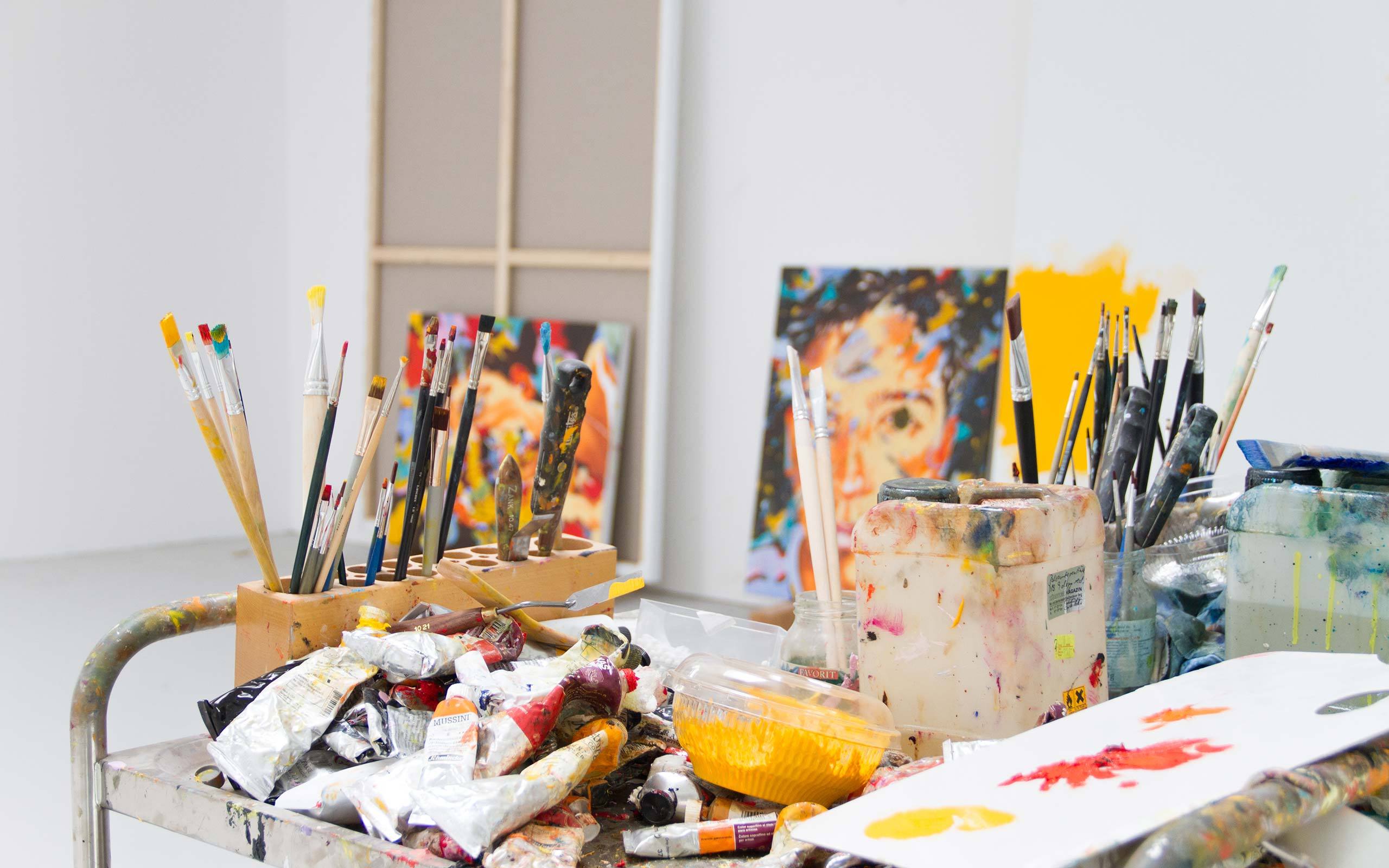
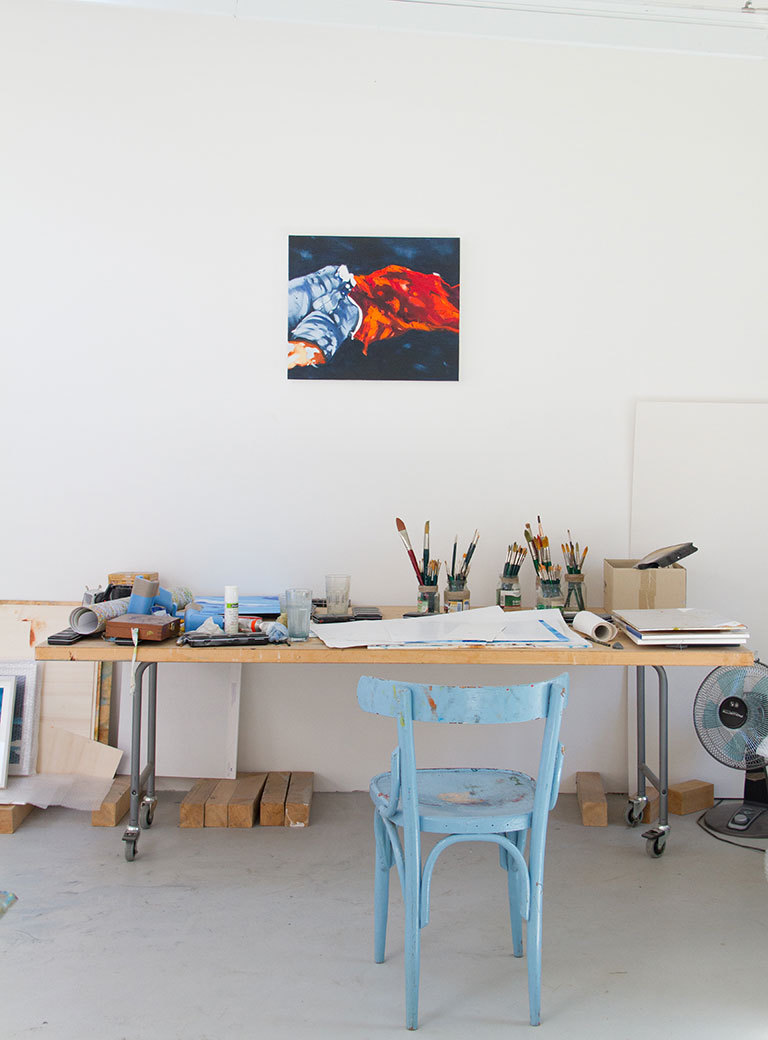
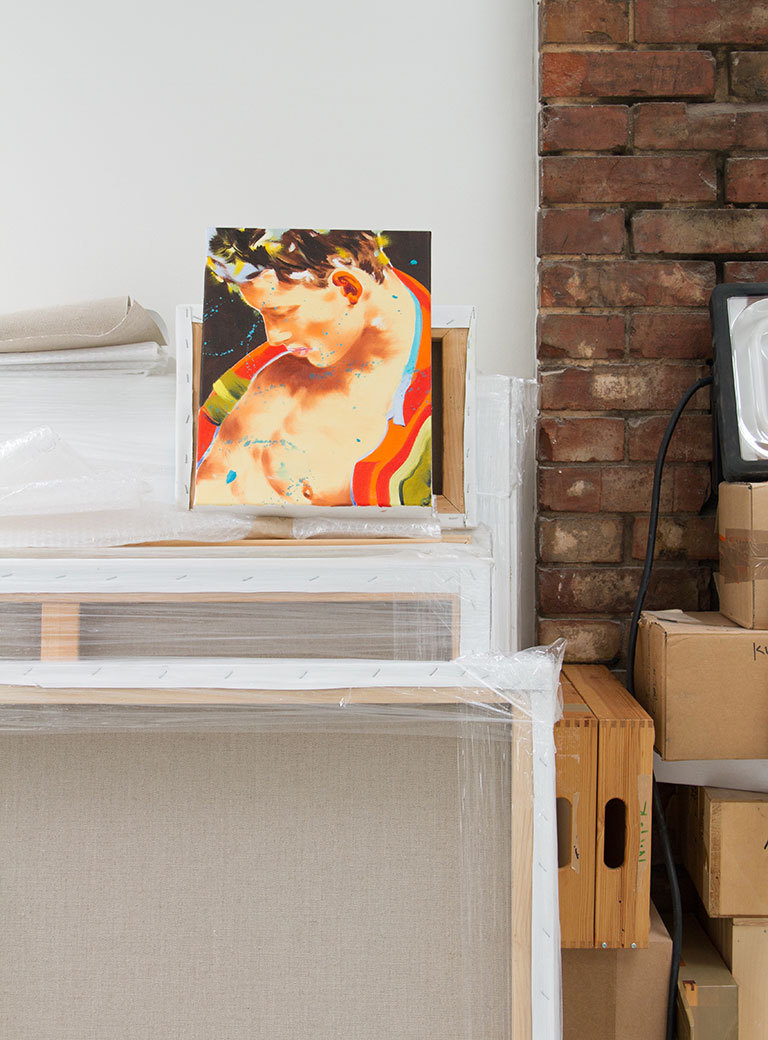
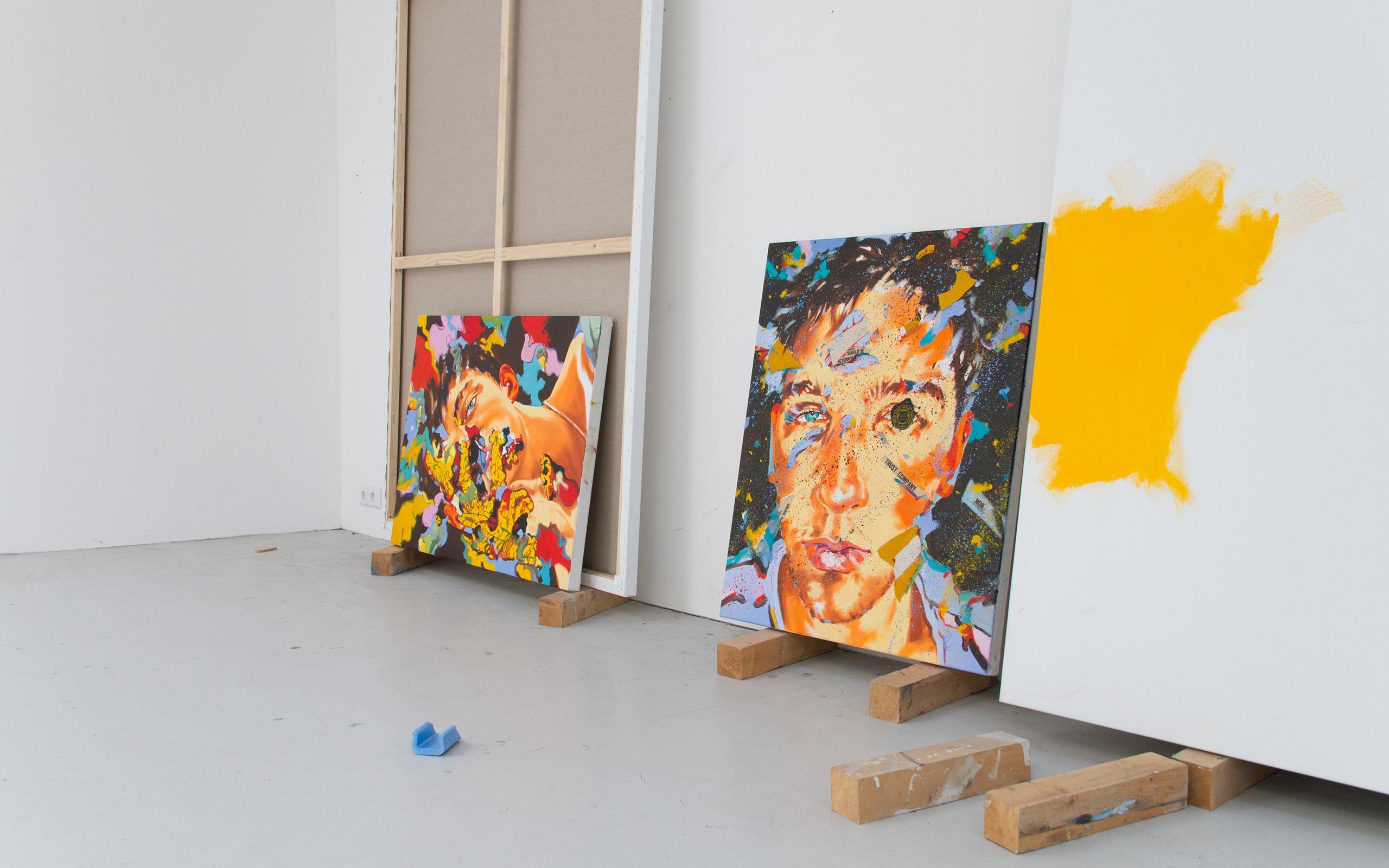
You studied with Georg Baselitz, who gave you the task of concentrating on your past.
Georg Baselitz said at the time, that it wouldn’t work if I could so to speak, beam myself at the touch of a button into the present time, but rather that I should reflect on my origins and concentrate on my dreams. In one’s early twenties one doesn’t immediately quite understand that; up until about 2005, 2006, I concentrated very intensely and very painfully on my past in East Germany.
In the past ten years that has not influenced my work at all. Now, however, I realize that the present is influencing me, and I don’t really know why. It may be because of the books I am reading right now, or it may be a result of the acute political situation with Russia.
Very quickly you had to experience the power of images, especially when they are subject to an ideological interpretation. You have been accused of appropriating Leni Riefenstahl’s Nazi aesthetic. How did you respond to this criticism?
I didn’t understand it at all. I don’t think that someone who grew up in Gelsenkirchen or Düsseldorf can immediately distinguish between a photograph of a torch parade celebrating the First of May and one of a Nazi torch parade. As teenagers we constantly participated in such marches and parades; for me it was obviously a manifestation of the pompous aesthetic of the Soviet Union with which I grew up.
Millions of people in the former Soviet Empire will have had the same experience. There are huge disparities within the pictorial memory of the reunited Germanys. I have observed that people from countries once culturally impacted by Russia interpret my work very differently from someone who grew up with Hollywood and pop culture. Initially the whole dimension of the dispute was not clear to me. For me these accusations are absurd inasmuch as I would have been one of the first whom the Nazis would have sent to a concentration camp. I have processed the aesthetic of the dictatorship in which I grew up. The aesthetic parallels are terrible enough.
In this aesthetic, we may also include figures of athletic young men..
And regarding the boys I would like to say something. Some will ask “why does he paint boys so often?” Even if I were to paint boys until the end of my life, and never paint anything else, the “Boy meets Girl” stories, with which I have been bombarded for so many years, would never be cancelled out. These are love stories and an aesthetic that addresses only marginally the experience of a gay minority that exists throughout the whole world. And quite honestly, if I felt like painting super-gay pictures for the rest of my life – what the fuck should be the problem? I am also able to accept the culture of the societal majority.
At the time you were only at the beginning of your career, did you consider whether you really wanted to confront this antipathy?
Yes, but only briefly, if I were ever to become too concerned when people say that what I do is complete shit, then, I would become implausible to myself.
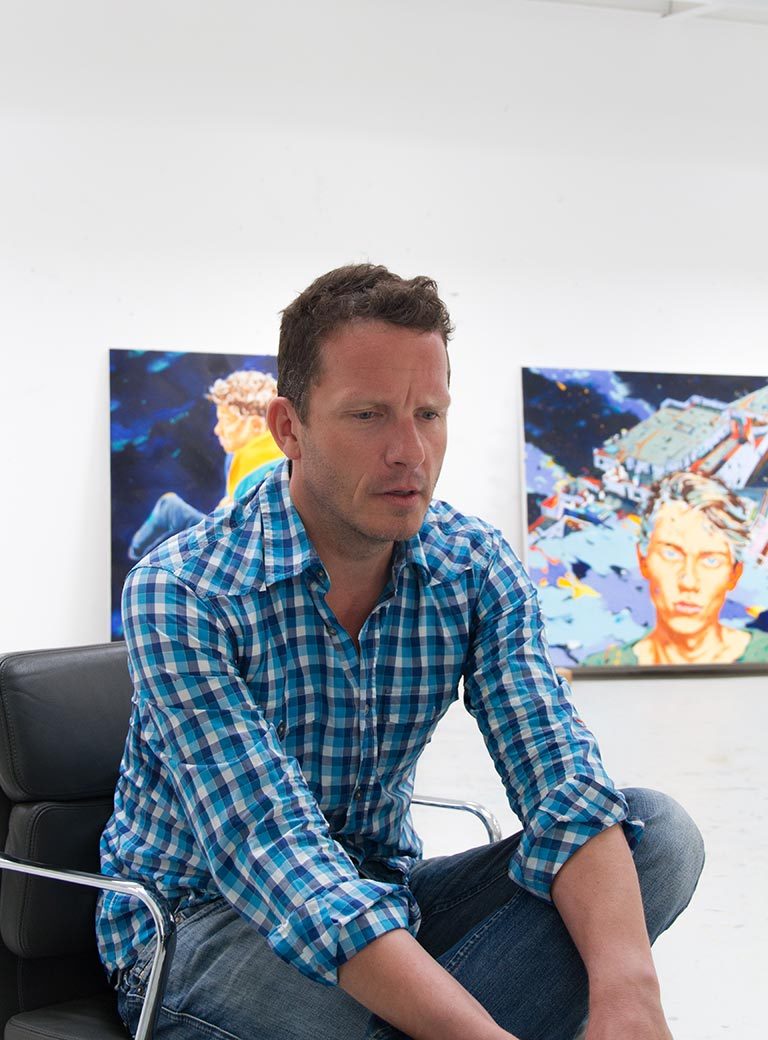
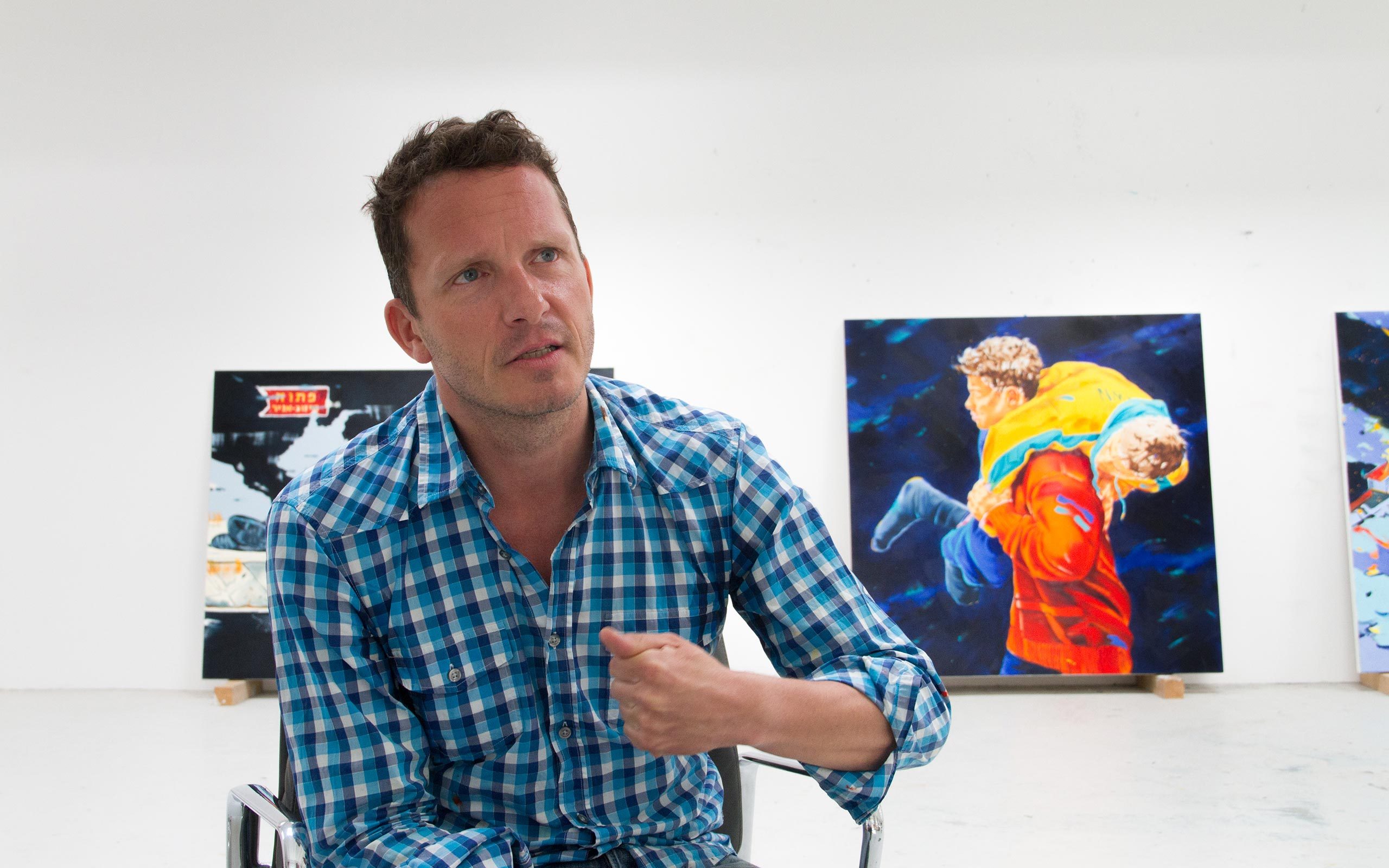
“Even if I were to paint boys until the end of my life, and never paint anything else, the 'Boy meets Girl' stories, with which I have been bombarded for so many years, would never be cancelled out.”
Your early works were very light, colorful paintings. That has changed a lot in recent years. One has the impression that the reality of time has darkened the pictures, what happened?
I don’t think I have changed that much, as far back as 2005 sinister and brutal scenes appeared in my paintings.. Since my sojourn in Madrid the paintings of the great Spanish masters Francisco de Goya and Jusepe de Ribera have greatly inspired me, for me there has always been a relationship with art history. Earlier I would have translated these scenes visually differently – in light, pastel hues. However, I had increasingly the feeling that this blocked the view of the content and at one point decided that I was finished with these kinds of paintings. Then I took other colors and heightened the contrast in my works; I don’t have the impression that there is a significant break overall in my work.
Looking around in your studio the dark backgrounds in your paintings are still in evidence today.
In the past, there were occurrences in my life that affected me over a long time. Before I went to Tel Aviv, there was a time in which my conditions caused me to become very abstract – no recognizable figures, no photographic elements, many things that had characterized my previous paintings had vanished. When I arrived in Israel, I noticed that the abstract problems that I had dealt with in Berlin would not work, there I was surrounded by so much reality, that I went back to painting in a precise figurative way.
Later, when I returned from Tel Aviv to Berlin, the same problems that I was confronted with in Israel were on my doorstep.. My studio was located in the South of Tel Aviv. The streets were filled with refugees. When I came back to Berlin, more and more refugees were coming in.
That was one year ago. Maybe it is deceptive, but hasn’t much changed in Germany since then?
It has. In the fall of 2015 conditions were bordering on the catastrophic. On a spontaneous impulse some friends and I created a foundation, purchasing generators and organizing buses where refugees could seek warmth. Like many Berliners, we understood that if we did not act then worse things were going to happen.
I have been captivated for a long time by the images of refugees, which I have seen with my own eyes, outside of the Lageso (Regional Office for Health and Social Affairs Berlin). With a little distance I then began to focus on the theme “escape” which led to several paintings and series, which I showed in São Paulo. It sounds at first absurd, but Brazil is a classic immigration country, escape is a omnipresent topic. I too have a personal connection for both of my parents were refugees.
I was often at the Lageso and I know many refugees personally. Meanwhile I have many Syrian friends. On my travels I have met many young people who are just as well educated, look just as good as we do, and they are theoretically as well equipped with everything as we are. And yet they will never have a chance of a life as we have here. I think one must be an extremely cold-hearted human being if one experiences and sees this and isn’t touched by it. I am touched by it and I try to include such things in my work.
Listening to you the theme achieves a totally new dimension. It steps aside from the entrapment of daily political thinking. Do you consider yourself a political person?
In the past I did not regard myself as political, however what has been happening in recent times has really politicized me and I think this is happening with many people right now.
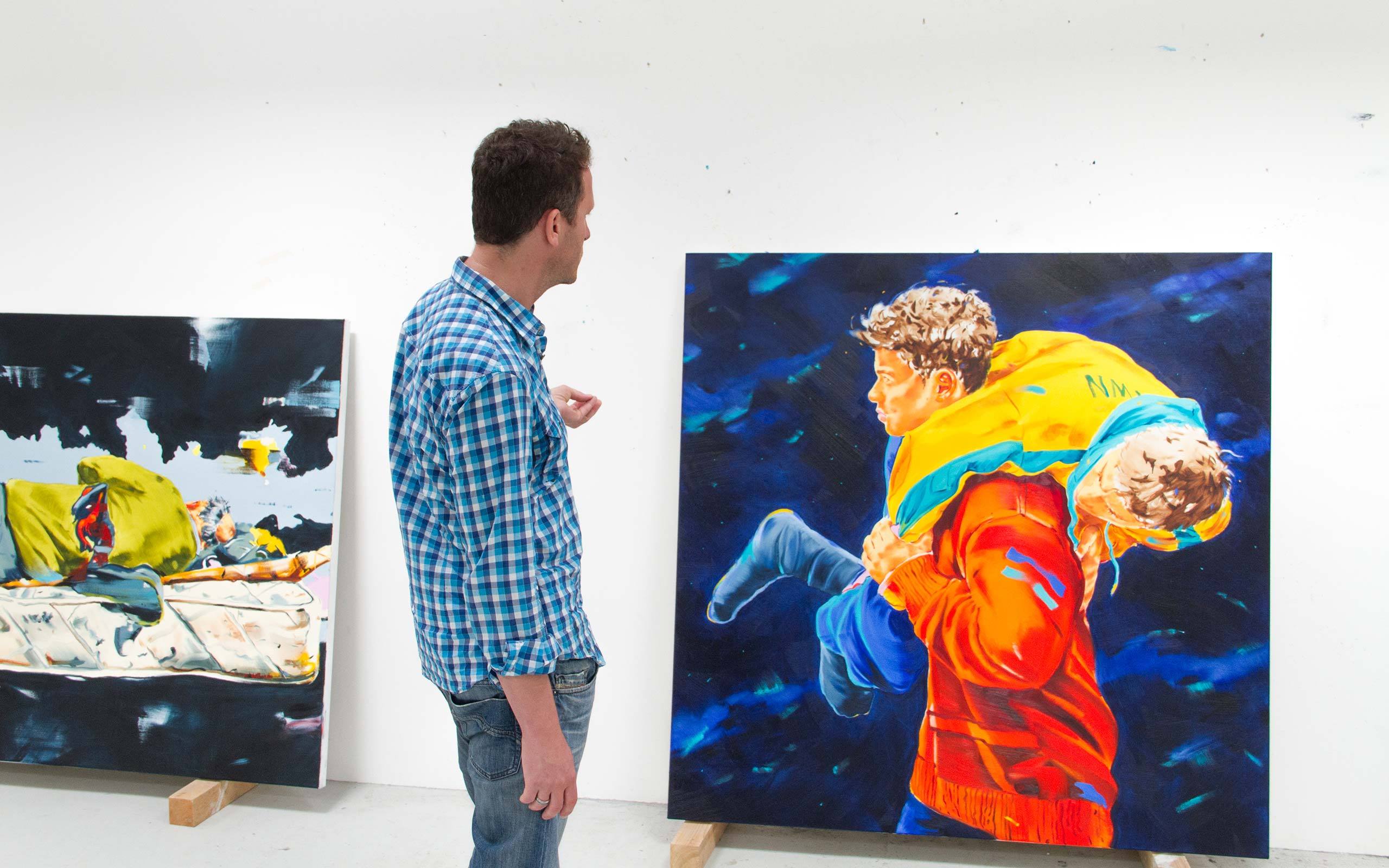
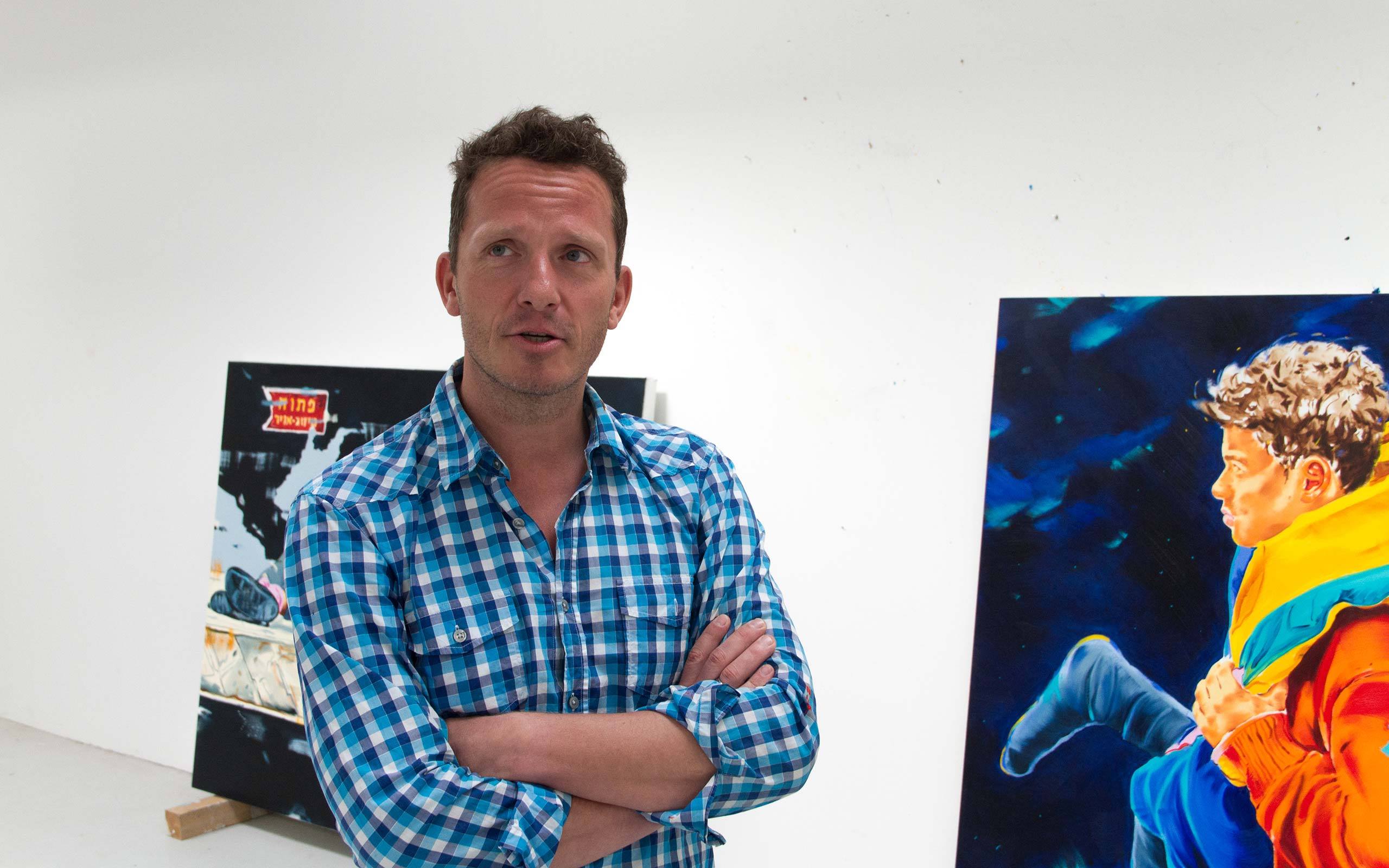
One must be an extremely cold-hearted human being if one experiences and sees this and isn’t touched by it.
How may we imagine your daily life in the studio? Do you go there in the morning knowing what is going to happen during the day?
Yes and no. I have the habit that when I leave the studio I know what I will start with the next day. I don’t have a complete idea about the day, but I know with what I shall begin with. Otherwise it could become difficult when I come in here and have no overlap from the previous day.
What happens then?
Sometimes nothing happens. That is in the sense of “to look at the paintings for two hours and plan how they could develop further.” But that’s okay.
It sounds as if you work for a very long time on a painting.
I have a friend, quite a well-known painter, who always says that I work very much. But that’s nonsense. I may be faster than he is but am certainly much slower than others. That is all very relative. I have the feeling that I need long a long time. It doesn’t take long to draw a line or dab a dot on the canvas. The decision processes that lead to it take a lot of time. I have to create a certain atmosphere. And that can take time.
Without doubt you are one of the most important contemporary German artists. You have achieved a picture book career as an artist and have been successful for many years. How do you feel about that?
I wouldn’t consider it a picture book career. But that’s always a very relative perception. It is true, I am alright now. I was also lucky, but that wasn’t always so. After my first exhibition one critic offered the opinion that is would only be a short flickering, that was sixteen years ago. Today I sit across from you and can grin about it.
Meanwhile your paintings are sold for impressive prices. Does it touch you?
The art market per se is rather irrelevant to me. It is good that I have the possibility to pay for my studio and pay for oil paint. Thank God, my works are not part of the huge hype of recent years and that nobody behind the scenes is turning the screws. On the contrary it is all very transparent. In my early years, I did feel pressure, waiting lists, all of that nonsense. Nowadays I work with people who give me the necessary time.
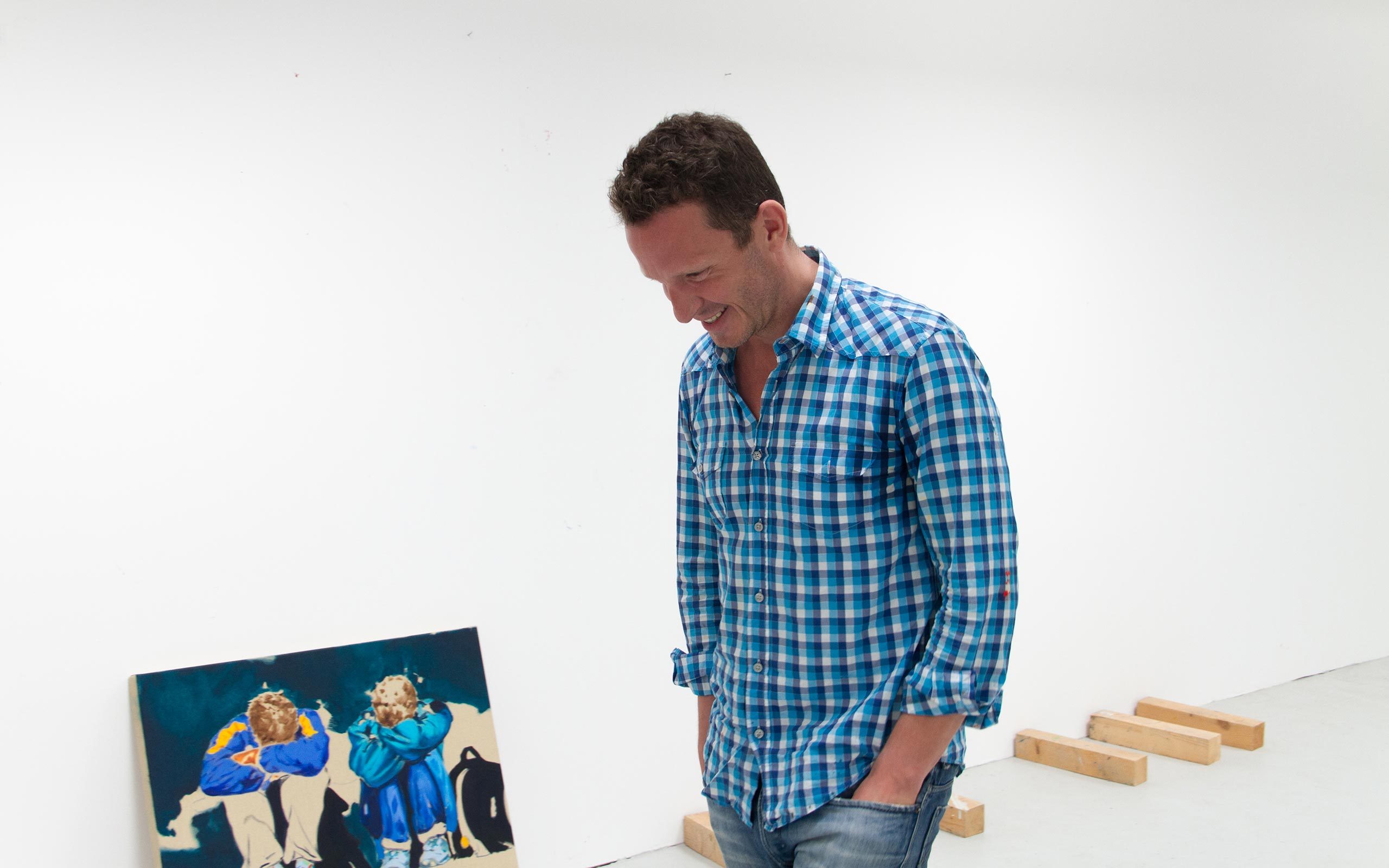
Interview: Michael Wuerges
Photos: Florian Langhammer


